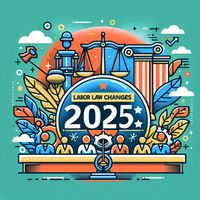Labor Law Changes Coming in 2025
As we approach 2025, significant shifts in labor laws are anticipated across various jurisdictions globally. These changes aim to address evolving workplace dynamics, enhance employee rights, and adapt to the technological advancements impacting labor markets. In this extensive guide, we will explore the upcoming legal transformations that could affect both employers and employees.

Overview of Major Labor Law Reforms
The year 2025 is set to usher in comprehensive reforms in labor legislation. These reforms are driven by the need to increase workplace flexibility, ensure fair compensation, and protect the health and safety of workers in a rapidly changing economic environment.
Increased Emphasis on Remote Work Regulations
As remote work becomes more prevalent, legal frameworks around the world are being adapted to better define remote work policies. Key areas of focus include:
- Home office stipulations: Clear guidelines on employer obligations for home office setups.
- Data protection: Enhanced laws to secure personal and company data outside traditional office environments.
- Work hours and rest periods: Regulations to prevent overwork and ensure adequate rest periods for remote employees.
Enhanced Worker Protections
In response to rising concerns about worker exploitation, new measures are being introduced to fortify workers' rights. These include:
- Minimum wage adjustments: Several countries are planning significant increases in minimum wage levels to combat inflation and cost of living increases.
- Gig economy regulations: New policies aimed at providing gig workers with greater job security and benefits akin to those of full-time employees.
- Anti-discrimination laws: Strengthened laws to further prevent discrimination based on age, gender, race, or sexual orientation in the workplace.
Focus on Health and Safety
The ongoing global health challenges have prompted a reevaluation of workplace health and safety standards. Important upcoming changes include:
- Mental health support: Mandates for employers to provide mental health support and resources.
- Safety protocols: Updated safety protocols to address new health risks, including those related to pandemics and other public health emergencies.
- Ergonomic regulations: New requirements for ergonomic work environments to prevent injuries related to remote working conditions.
Sector-Specific Changes
Different sectors will experience varying degrees of regulatory changes based on specific challenges and opportunities within those industries. Here’s what employees and employers can expect:
Technology Sector
Innovations in technology continue to disrupt traditional labor models in the tech industry. Key legislative updates include:
- Data security roles: Introduction of specific roles and responsibilities concerning data security management.
- AI governance: Laws governing the use of artificial intelligence in the workplace, focusing on ethical implications and job displacement issues.
Healthcare Sector
The healthcare sector is set for transformative changes aimed at better addressing patient care and employee welfare. Changes include:
- Nurse-to-patient ratios: Laws enforcing specific nurse-to-patient ratios to improve care quality and reduce worker burnout.
- Overtime regulations: Stricter controls on overtime practices to protect healthcare workers from excessive work hours.
Retail and Hospitality
Retail and hospitality will see reforms tailored to enhance worker rights in these high-interaction environments. Anticipated changes include:
- Tipped wage calculations: Modifications in how tipped wages are calculated and applied.
- Scheduling rights: Regulations that guarantee more predictable work schedules for employees in these sectors.
Global Impact of Changes
The international scope of these labor law changes highlights a global shift towards more progressive labor policies. This section examines impacts on various regions including North America, Europe, Asia, and emerging markets.
North America
In the United States and Canada, labor law modifications are largely focused on enhancing worker protections in the gig economy and improving compensation standards across various sectors. Specific attention is being given to technological adaptation in labor laws.
Europe
European nations are leading with reforms aimed at increasing transparency in employment contracts and bolstering social security systems to better accommodate freelance and part-time workers.
Asia
In Asia, rapid industrial growth necessitates robust regulations focusing on occupational safety, fair wages, and protection against exploitation in manufacturing hubs.
Action Steps for Businesses
To navigate these changes effectively, businesses should consider the following strategies:
- Policymaking involvement: Engage with policymakers to influence favorable outcomes during the legislative process. Risk assessment: Conduct comprehensive risk assessments related to workforce management under new laws.Training programs: Implement training programs for HR professionals on updated compliance requirements.
Action Steps for Employees
To prepare for the impending changes, employees might want to take proactive steps such as staying informed about new laws relevant to their industry, participating in union activities or advocacy groups focused on labor rights, and seeking legal advice when necessary.In Conclusion
The upcoming changes in labor laws by 2025 promise a reformed landscape that supports fairer working conditions, enhanced safety measures, and better compensation structures. Both employers and employees need to stay informedFind out more...

Discover the latest trends in art, cinema, music, and pop culture. Explore reviews, analysis, and news from the entertainment world and the global art scene.

Find information about cars, motorcycles, and vehicles in general. Explore buying guides, comparisons, industry news, and maintenance tips.

Get tips on skincare, hair, makeup, and wellness. Find information about diets, physical exercises, and beauty trends to maintain a healthy lifestyle.

Reviews, recommendations, and updates from the literary world. Discover classics, new releases, and trends from the world of books and renowned writers.

Everything about the world of business, investments, and industry. Follow market analysis, business trends, and innovations in the corporate sector.

News and analysis about technology, gadgets, and innovations. Learn more about hardware, software, and trends from the digital world.

Tips on saving, investing, and financial planning. Learn how to better manage your money and make smart financial choices.

Recipes, food tips, and news from the food sector. Discover trends, restaurants, and beverages to enhance your culinary experience.

News, analysis, and releases from the gaming world. Stay updated on the latest games for PC, consoles, and mobile devices.

Information about health, wellness, and medical care. Learn more about diseases, treatments, nutrition, and healthy habits.

Suggestions for recreational activities, hobbies, and leisure. Discover new ways to entertain yourself and relax during your free time.

Tips on home decor, organization, and gardening. Find ideas to transform your home into a more comfortable and cozy space.

Everything about connectivity, social networks, and digital communication. Stay updated on major trends and online news.

Information about the job market, careers, and professional development. Discover courses, resume tips, and job opportunities.

News on legislation, public policies, and citizens' rights. Stay informed about laws, regulations, and government actions.

Topics about culture, behavior, and human relationships. Explore social debates, diversity, and trends in human interaction.

Care, nutrition, and wellness for pets and animals. Get tips on raising and living with dogs, cats, and other species.

Discover the latest scientific breakthroughs and research. Stay updated on innovations and interesting facts from the world of science.

Shopping guides, product reviews, and deals. Find recommendations and comparisons to make the best consumer choices.

News and analysis on national and international sports. Stay informed on competitions, athletes, and everything about the sports world.

Travel tips, itineraries, and experiences around the world. Discover incredible destinations, local culture, and recommendations for planning your trips.